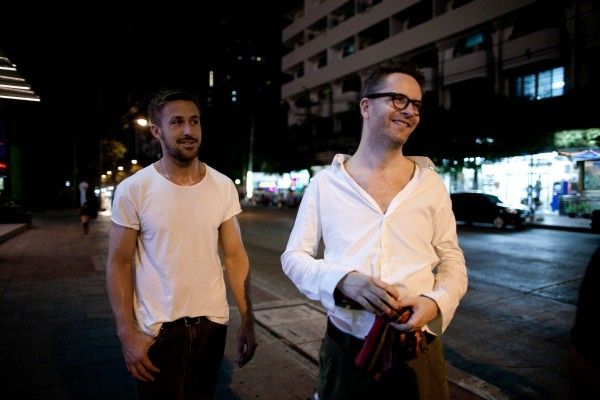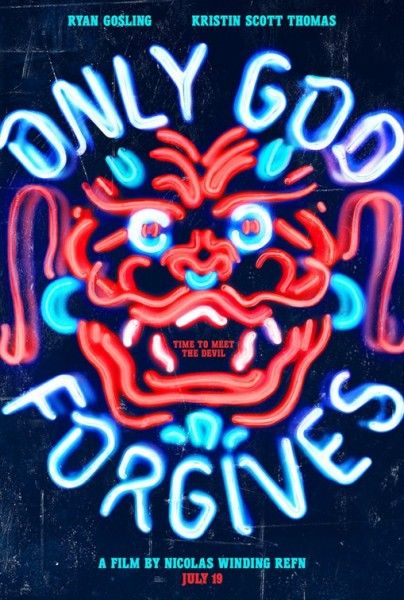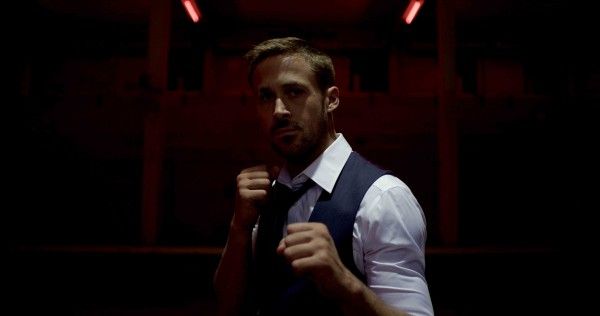From filmmaker Nicolas Winding Refn (Drive), Only God Forgives tells the story of Julian (Ryan Gosling), an American fugitive who runs a boxing club in Bangkok as a front for his drug business. When his mother (Kristin Scott Thomas), who is the head of a vast criminal organization, arrives from the U.S. to collect the body of her murdered son, she demands vengeance.
At the film’s press day, Nicolas Winding Refn spoke to Collider for this exclusive interview about what inspired the movie, how the experience of making Drive affected the script, how audiences have reacted to the film, that he doesn’t shoot any wasted footage, and how a small side story for the Bernie Rose (Albert Brooks) character in Drive was one of the only things he’s ever cut from one of his films. He also talked about how he’d like to focus on his Barbarella television series next, why his remake of Logan’s Run didn’t work out, and how he would like to do a big studio project, at some point. Check out what he had to say after the jump.
Collider: How did this movie come about for you?
NICOLAS WINDING REFN: The idea of the movie was many different things. I don’t have one thing that sets me in motion. I would probably say that the first thing that started the whole flow of images for the film was the sense of holding your arm and realizing that it was an extension of your erection, and that it’s a violent mechanism. And then, [you turn it] and it’s total submission. There is a movie, in that movement.
You had this film ready to go before Drive, but then ended up making Drive first. Did the experience of making Drive affect this film, when you finally went back to this?
REFN: It did. This was written before Drive. I was going to make it before Drive. It was ready to go before Drive. And it was good that I had waited because, after Drive, I knew that I wanted to make a movie that was pure and simple. I wanted to do an acid trip. I went to Thailand to prepare everything, and then I continued to minimize the film and scale it down to just a waterfall of images that would create a story. I shoot films in chronological order, so I could really control it, as much as possible, along the process.
Have people reacted to this film differently than you expected, especially having seen Drive?
REFN: I don’t have any expectations. People want the same thing, but it’s the one thing they must not get because then nothing has changed. It’s like when Lou Reed did the album Transformer, which is one of the greatest rock albums of all time. His next album was an LP of guitar distortions. For me, it’s an evolution of my own creative obsession. And it’s a way to free myself from what people want and expect.
Above and beyond good or bad reviews of your movies, is it most important that people just talk about them?
REFN: You can’t define this film as good or bad because it’s insignificant. It’s more about the experience. The conversations are an example of success because then you know whatever you’ve done has resonated. The line between love and hate is so fine. They’re very much the same thing. Don’t forget that Drive was very polarizing. Not everyone loved that movie. But, they learned to love it, once they thought about it. It’s the same mechanism that happens with all my movies.
Since the attention and acclaim that Drive got, do people trust your vision more?
REFN: I don’t know. I haven’t thought about that. Maybe. My financing comes out of France, so they’re much more art-minded.
Has it surprised you that you’ve had the reaction that you’ve had, with Drive and Only God Forgives, because American audiences view films differently?
REFN: I don’t really think they do. I think there’s a large percentage of the American audience that views the same thing as everyone else. But, this country is very much about money. People very quickly define success due to the amount of money something makes. In the end, I think everyone is searching for that experience. That’s why we continue to go to the movies and watch television.
How long was your first cut of this film, and are there many deleted scenes?
REFN: No, I don’t shoot any waste.
Do you have any deleted scenes, from any of your other films?
REFN: Not really, no. I think on Drive there was a small side story for the Bernie Rose (Albert Brooks) character that I unfortunately couldn’t get to work with the flow of the movie. Otherwise, I’ve cut very few things. I don’t shoot a lot of material. My scripts are very short.
You’ve had a lot of various projects come your way and you’ve been talked about, in relation to various things. Do you know what your next project will be?
REFN: I want to concentrate on my TV show, which is Barbarella. That’s what I want to do next.
Why Barbarella?
REFN: I have daughters, so I felt I wanted to do a show that they could see. I think that television has become really, really interesting, in terms of character development. You can have 13 hours to develop a character, as opposed to 25 minutes in a movie. That excites me.
What was it that ultimately made it too difficult to get the Logan’s Run remake going?
REFN: It was scheduling problems and commitment problems. I didn’t feel like I was ready when they needed to go, and I didn’t want to hold anybody up on it. It was a great experience, developing the movie. I had a great time, but it just was not the right time.
Because you had a good experience with the development, are you more open to doing a big studio film, at some point?
REFN: I would like to do a film like that, at one point, for sure. It’s like a kid in a candy store. It’s very intoxicating.
Only God Forgives is now playing in limited release.




